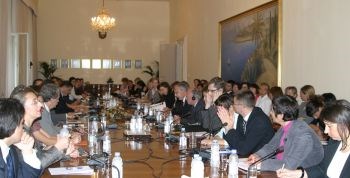- Published: 18.09.2009.
MFAEI organized lecture on perspectives of Croatian citizens’ representation in EU institutions
In the opening part of the lecture, State Secretary for Political Affairs Davor Božinović spoke about the importance of the Croatian citizens’ role in the EU institutions
Cooperation and Culture Advisor at the French Embassy Denis Dobo-Schoenenberg spoke about the position of France, as an EU member, towards its citizens’ employment in the EU institutions. Concluding that France’s participation in the EU institutions, politics and language-wise, is stagnating, he presented the guidelines which the French public administration bodies are following in order to rise to that challenge. He also talked about the structure of the French employees within the European Commission, as well as about the efforts of the relevant French bodies regarding the planning and support for the candidates, emphasizing the need for those activities to be carried out continually.
The Head of the Department for Preparation Applications at the Center for European Studies, Julie Leprêtre, presented the French model of preparing candidates for job applications in the EU institutions, as well as the Center’s activities as regards informing and preparations for applying. Speaking about the possibilities of employment in the EU institutions, she pointed out the importance of applying to competitions on the eve of or immediately after a new member has been admitted, since it is only in that period that special competitions are being published specifically for the new member’s citizens.
Although employees of the EU institutions do not advocate national, but general European interests, their knowledge of the system, procedures and personal contacts are particularly useful to the candidate countries, said Head of the Mission of the Republic of Croatia to the European Communities Branko Baričević. He drew attention to the possible expert brain drain to the EU institutions, finding solution in the adequate education and training of a sufficient number of experts that should satisfy the needs of the national administration.
The participants concluded that it is extremely important to set up one’s own system of preparing, informing and support for their citizens who want to work in the EU institutions, and to view such employment as something positive that benefits both the national and the European public administration.
Present at the lecture were coordinators for European affairs in Croatia’s public administration bodies and officials of the Ministry of Foreign Affairs and European Integration.



